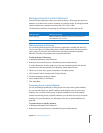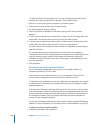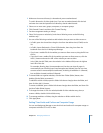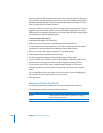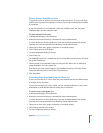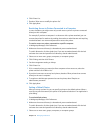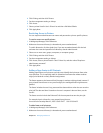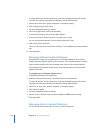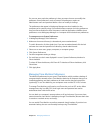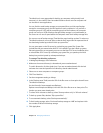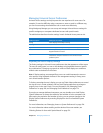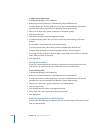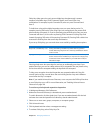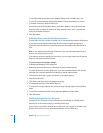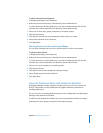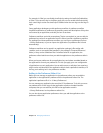
Chapter 10 Managing Preferences 225
If a user can see a particular preference, it does not mean the user can modify that
preference. Some preferences, such as Startup Disk preferences, require an
administrator name and password before a user can modify its settings.
The preferences that appear in Workgroup Manager are those installed on the
computer you’re currently using. If your administrator computer is missing preferences
that you want to disable on client computers, install the applications related to those
preferences or use Workgroup Manager on a computer that includes those preferences.
To manage access to System Preferences:
1 In Workgroup Manager, click Preferences.
2 Make sure the correct directory is selected and you are authenticated.
To switch directories, click the globe icon. If you are not authenticated, click the lock
and enter the name and password of a directory domain administrator.
3 Select one or more users, groups, computers, or computer groups.
4 Click System Preferences.
5 Set the management setting to Always.
6 For each item you don’t want displayed in a user’s System Preferences, deselect its
Show checkbox.
To select all Show checkboxes, click Show All. To deselect all Show checkboxes, click
Show None.
7 Click Apply Now.
Managing Time Machine Preferences
Time Machine preferences let you control Time Machine, which provides a backup of
computer data to network servers. Time Machine backs up all computer data, such as
installed applications and their preferences, all local account data, and system files
(optionally). To use Time Machine, your computers must run Mac OS X v10.5 or later.
To manage Time Machine, you’ll need to run file services, such as AFP service. When
managed users log in to Mac OS X, their login name and password are used to
authenticate them with the file server.
You can back up a computer’s startup volume or all local volumes. If your users have
network accounts, their data isn’t backed up through Time Machine (because their data
is stored on a network server, not locally).
You can enable Time Machine to perform automatic hourly backups. If you don’t use
automatic backup, the user can manually back up using Time Machine.



